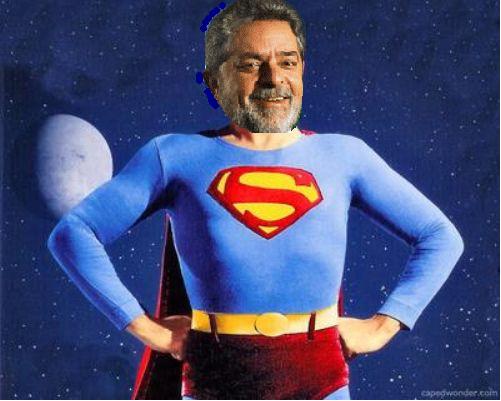True Revolution: the Lula Generation and the New Brazil
Luiz Inácio da Silva, known as Lula, will go down in history as the president who brought Brazil to the First World. The president who took, in one decade, 30 million Brazilians out of poverty. Financial aid was given to more than 12 million poor Brazilian families on condition that their children attend school and get vaccinated. This has become the largest conditional cash transfer program in the world and has had the effect of reducing poverty in Brazil by more than 27%.
Those people Lula benefited are now part of the new middle class: 60% of them have computers, 40% bought their own home, 29,6% bought a new car just these past two years. 68% of the kids from Brazil's new middle class are more educated than their parents (which ensures the trend of keep going up in economic power). From the 5,5 million students frequenting Brazil's private high schools today, 2,7 million come from the families which left poverty in the last 8 years. There are 58,6 million home units in Brazil. 73,6% are already owned by the person living in it, of which 69,4% have their residence fully paid. Only 17% of people still pay rent.
Unemployment is only 5,7%. Inflation fell from 2,076% in 1994 to 66.1% in 1995 to 16% in 1996 to 6% now. All according to the Brazilian Statistics Institute.
Lula also reduced poverty by improving the job market, interrupting the cycle of poverty that crossed from one generation into the next.
All that shows a clear contrast with Venezuela, where Hugo Chávez implemented radical policies that scared away investment, with oil rigs rusting, bridges falling apart, power outages and crime and inflation setting new records. While Brazil’s economy grew almost 8% this year, Venezuela’s economy will fall by 1.6 % (the second-worst performance in Latin America after Haiti), according to estimates from the United Nations Economic Commission for Latin America and the Caribbean.
Under Lula, Brazil developed a self-confidence and a drive that turned the country into a global favourite for financial investors, besides getting the 2014 football World Cup and the 2016 Olympics, which will be used to showcase to the world how Brazil has changed its violent drug ridden shantytowns into middle class communities.
Lula's programs did not discourage work - on the contrary, people had to prove they were investing in their own education and that of their kids, if they had any. Studies have shown that the State hand-out money was spent, in order of priority, on 1) food; 2) school supplies; 3) clothing; and 4) shoes (in tropical Brazil, about 2 million poor kids had never had even one pair of shoes by the age of 14).
As there is the expression Husákovy děti here, in Brazil my age peers are called the Lula generation. Brazil suffered a military coup in 1964, supposedly to avoid a communist putsch by then president Jango (João Goulart).
Lula became a sort of Lech Walesa of the tropics: a proletarian working for the automobile industry, almost illiterate, who dared to challenge the status quo. In 1979 he became a household name after daring to promote a strike of the automobile industry workers. The fight was for higher wages, but the military government, allied with the corporate managers, decided to use police force and national security laws, spinning it into a political opposition movement. Singers, actors and influential Catholic priests lent their celebrity to bring the attention to Lula, the union leader turned symbol of dissidence. My generation was marked by his courageous blind fight for human rights and the end of dictatorship.
Lula could not form a full sentence without grammatical mistakes, thanks to having frequented school only up to the fourth grade, and his proletarian style was rejected in every presidential election since 1988 until he was finally chosen in 2002. Although admired, nobody believed he could be a president. But that almost illiterate worker is now considered the best president ever in the 510 year history of Brazil. He was born poor in north-eastern Brazil, lost a finger while working in a factory, became a trade union leader and, eventually, Brazil’s president and one of the world’s most respected leaders.
His changes are not temporary, they are recognized by foreign experts and press as a solid change of Brazil into the top five most powerful and wealthy countries in the world, ensuring an influential role in the global stage. Lula angered Obama by opening an alternative negotiation channel with Iran and by ignoring the pleads from a hunger striken dissident from Cuba. To continue to show independence from Washington, just before leaving office, Lula recognized the State of Palestine, angering Israel, he also refused to concede the extradition to Italy of ex-leftist supposed terrorist Cesare Battisti and offered open support for Julian Assange and Wikileaks.
In her inauguration speech, his successor Dilma Rousseff vowed to "fight the rich world's grip on the United Nations, especially its Security Council". On the other hand, Dilma has announced that she will take a different approach towards Iran and Cuba, because, as a former guerrilla activist who was tortured for many months, she is admant about having zero tolerance for lack of freedom of press and human rights abuses. She repeated in her inauguration that she rather have "a loud press attacking than a silent press supporting" her government.
Lula gave the first kick, Dilma Rousseff is expected to finalize his objectives. She took office underlining that her top objective is to put an end to the leftovers of poverty still existing in Brazil, eliminating homelessness in one term. And no one is doubting it, not even the opposition.
Brazil has simply become so rich that it can allow itself to offer clever hand-outs that are well monitored, with tied up requirements that lead to the education of the lower classes, thus to their potential employment. His economic and social revolution can serve as a model for leftist governments the world over. Lula was pragmatic, made alliances even with his former persecutors, openly saying that since his union days he learned that compromise means giving up something important to get something even more important.
He didn't have to curtail press freedoms nor shut the opposition. He found the right balance that allowed the full forces of free market to mingle with State help to those living on the fringe of society.
Brazil will be the 5th largest economy by 2016
http://www.thenewage.co.za/6844-1026-53-%E2%80%98Brazil_will_be_the_5th_largest_economy_by_2016%E2%80%99
Lula Leaves Behind A Transformed Brazil
http://www.time.com/time/world/article/0,8599,2039831,00.html
Lula leaves office as Brazil's 'most popular' president
http://www.bbc.co.uk/news/world-latin-america-12097490

Brazil in data:
190.732.694 inhabitants, 97.342.162 of which are women.
Women: 51,3% Men: 48,7%.
From the total of working people, 42,6% are women. 11,1% of women are unemployed, while only 6,2% of men.
160.879.708 live in urban areas.
23.760 are over 100 y.o.
66,6 million adult Brazilians are married, while 62,2 million are single. More men are married than women: 47,6% versus 44,2%.
In 1990, Brazilian women had about 3,6 children per capita, the first at around 19 y.o. In 2009, women had about 1,8 children each, the first at 24.
It all started with the strikes (1979) in the region called ABC Paulista, where the automobile industry was concentrated:

 Příliš drahá fotovoltaická chyba
Příliš drahá fotovoltaická chyba Anglický deník: Kdo je dneska vlastně kovaný Brit?
Anglický deník: Kdo je dneska vlastně kovaný Brit? Deník dobrovolníka: Jak jsem si připsal další bojové úlovky
Deník dobrovolníka: Jak jsem si připsal další bojové úlovky Invaze nanečisto aneb Velké dojmy z malé invaze přes tichý rybník
Invaze nanečisto aneb Velké dojmy z malé invaze přes tichý rybník Trump německému kancléři: Invaze v Normandii pro vás "nebyl příjemný den"
Trump německému kancléři: Invaze v Normandii pro vás "nebyl příjemný den"

